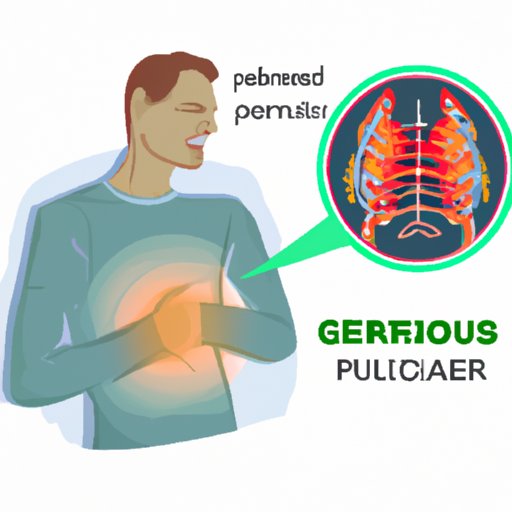
What are the Symptoms of Reflux?
Acid reflux, commonly known as heartburn, is a medical condition that occurs when stomach acid flows back up into the esophagus. This condition can cause a range of symptoms, from mild discomfort to severe pain and complications.
Recognizing the symptoms of reflux is essential in managing this condition. In this article, we will discuss the seven most common symptoms of reflux, as well as less well-known symptoms, and explain how to identify and manage them.
7 Common Symptoms of Reflux: Know the Signs
Heartburn is the most common symptom of reflux, characterized by a burning sensation in the chest that often worsens after eating or lying down. Other common symptoms of reflux include:
- Regurgitation: a sour or bitter taste in the mouth;
- Chest pain or discomfort;
- Difficulty swallowing;
- Feeling full or bloated;
- Excessive burping;
- Nausea; and
- Bad breath
While these symptoms can be uncomfortable and disruptive to daily life, they can often be managed with lifestyle changes or over-the-counter medications. However, if the symptoms persist or become more severe, it is important to seek medical attention.
Heartburn? Nausea? Sore Throat? It Could Be Reflux
Many people mistake the symptoms of reflux for other conditions, such as heart attacks, allergies, or infections. However, reflux can cause specific symptoms that may be an indication of this condition and require different treatment approaches.
Three symptoms that are often attributed to other conditions are:
- Heartburn: characterized by a burning sensation in the chest, heartburn can often be mistaken for a heart attack or angina;
- Nausea: a common symptom of viral infections and food poisoning, nausea can also be caused by reflux;
- Sore throat: often attributed to colds or allergies, a persistent sore throat can be a sign of reflux and irritation of the esophagus
If you are experiencing any of these symptoms and suspect they may be related to reflux, it is important to seek medical attention to determine the underlying cause and appropriate treatment.
Feeling the Burn: Signs and Symptoms of Reflux
While heartburn and regurgitation are the hallmark symptoms of reflux, there are other, less common symptoms that can also indicate this condition. These symptoms include:
- Hoarseness or laryngitis: inflammation of the vocal cords caused by acid from the stomach;
- Difficulty swallowing or a sensation of food getting stuck in the throat;
- Chronic coughing;
- Bad breath and taste in the mouth;
- Wheezing and shortness of breath;
- Chest pain and discomfort; and
- In severe cases, coughing up blood
If you experience any of these symptoms, it is important to seek medical attention as soon as possible. These symptoms can indicate complications from untreated reflux, such as acid damage to the esophagus, ulcers, and even an increased risk of esophageal cancer.
Don’t Ignore These Symptoms of Reflux
Untreated or poorly managed reflux can have serious long-term consequences, such as esophageal damage, ulcers, and cancer. It is important to recognize and address the symptoms of reflux early on to prevent these complications.
If you experience any of the symptoms discussed in this article, it is essential to seek medical attention. Your doctor can evaluate your symptoms, perform any necessary tests or procedures, and recommend appropriate medication and lifestyle modifications.
Reflux Alert: How to Recognize the Signs
To help manage reflux symptoms, there are specific strategies that you can implement, such as:
- Keep a symptom diary to track your symptoms and identify triggers;
- Avoid trigger foods, such as fatty or spicy foods, citrus fruits, and carbonated beverages;
- Stop smoking;
- Elevate the head of your bed;
- Avoid eating before bedtime; and
- Manage stress through relaxation techniques
By following these strategies, you can manage reflux symptoms and improve your overall quality of life. If you are struggling with reflux, there are many resources available to help.
Is It Reflux? The Top Symptoms You Need to Know
It is important to recognize the signs of reflux and distinguish them from other conditions or illnesses that may share similar symptoms. The key symptoms of reflux to watch for are :
- Heartburn;
- Regurgitation;
- Chest pain or discomfort;
- Difficulty swallowing or a sensation of food getting stuck in the throat;
- Feeling full or bloated;
- Excessive burping;
- Nausea;
- Bad breath;
- Hoarseness or laryngitis;
- Chronic coughing;
- Wheezing and shortness of breath;
- Chest pain and discomfort; and
- In severe cases, coughing up blood.
If you experience any of these symptoms, it is important to seek medical attention to determine the underlying cause and appropriate treatment.
Conclusion
Reflux is a common medical condition that affects many people. However, with proper diagnosis and management, it is possible to manage the symptoms of reflux and prevent long-term complications. If you experience any of the symptoms discussed in this article, it is important to seek medical attention to determine the underlying cause and appropriate treatment.
By following the strategies outlined in this article, you can manage your reflux symptoms and improve your overall quality of life.





